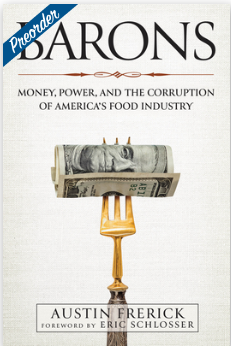I’m on the visionary panel. To register, click here.

Austin Frerick. Barons: Money, Power, and the Corruption of America’s Food Industry. Island Press, 2024. With an Introduction by Eric Schlosser.

Wow. This is one important book.
Frerick’s thesis is that a small number of individuals or families have been allowed to accumulate unconscionable levels of wealth by exploiting or getting around laws (mostly legally but sometimes with bribes), pressuring government to collude, and doing everything possible to enrich themselves at the expense of community and worker welfare—all in the name of low food prices for consumers whether or not they are the reality.
Frerick takes on family enterprises in pigs, grain, coffee, dairy, berries, animal slaughter, and groceries.
This is one tough book. Frerick structures the chapters to describe the rise of the families’ fortunes, how they exploited rules and customs, and how that got government to collude in giving these companies so much market share and power.
I learned a lot from every chapter, so much that I found myself checking references—-these are extensive—constantly to find our where he had gotten information I’d never seen before.
.About Walmart’s payment of low wages to employees, for example, Frerick writes,
These low wages also obscure a generous hidden subsidy that the company receives from taxpayers. Many Walmart employees depend on government public assistance programs such as Medicaid (health care), Earned Income Tax Credit (a low-wage tax subsidy), Section 8 vouchers (housing assistance), LIOHEAP (energy assistance), and SNAP (food assistance), among others. In 2013, one estimate by congressional House Democrats found that taxpayers subsidized Walmart to the tune of more than $5000 per employee each year….In effect, instead of paying a living wage to these employees, the Walton family shifts the burden to taxpayers.
Not only that, but SNAP users spend a lot of their benefits at Walmart.
With some back-of-the-envelope math, I came up with a rough estimate that Walmart now receives somewhere around $26.8 billion each year from SNAP.
The chapter on JBS, the Brazilian company now one of four companies controlling 85 percent of meat slaughtering, is particularly worth reading for its documentation of the company’s use of bribery to achieve its ends.
If you want to know how corporations control the food supply, start here.